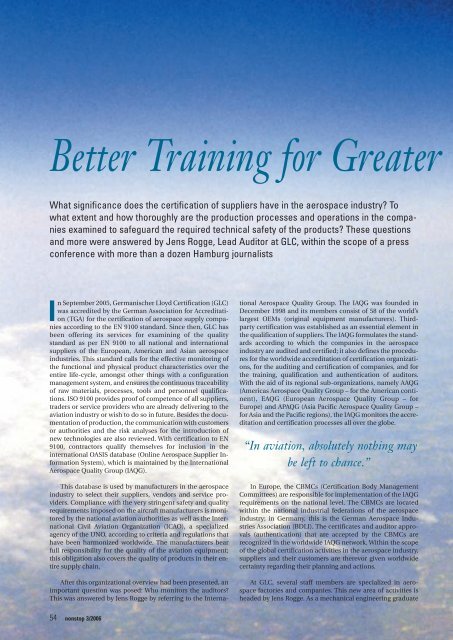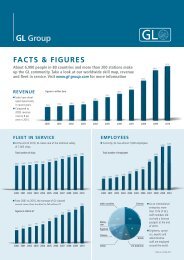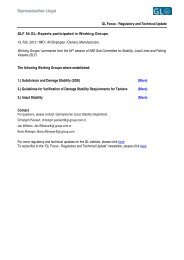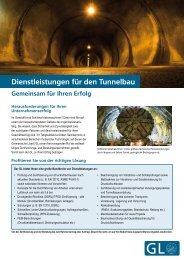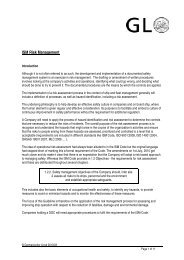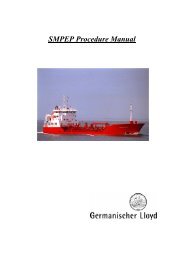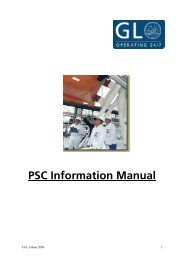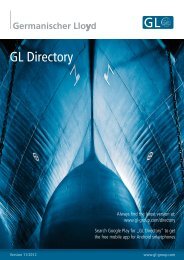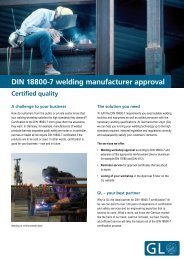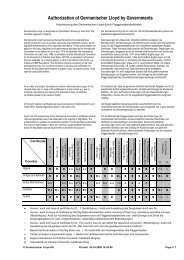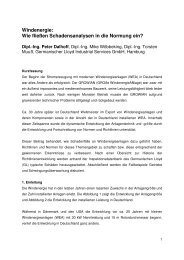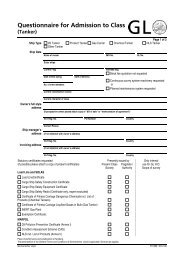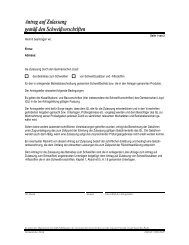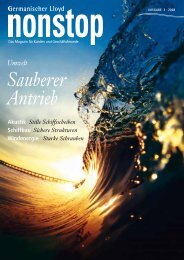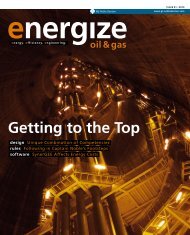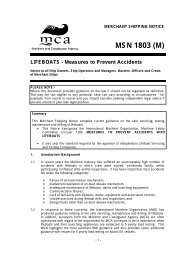Yards Moving Forward - GL Group
Yards Moving Forward - GL Group
Yards Moving Forward - GL Group
You also want an ePaper? Increase the reach of your titles
YUMPU automatically turns print PDFs into web optimized ePapers that Google loves.
Better Training for Greater<br />
What significance does the certification of suppliers have in the aerospace industry? To<br />
what extent and how thoroughly are the production processes and operations in the companies<br />
examined to safeguard the required technical safety of the products? These questions<br />
and more were answered by Jens Rogge, Lead Auditor at <strong>GL</strong>C, within the scope of a press<br />
conference with more than a dozen Hamburg journalists<br />
In September 2005, Germanischer Lloyd Certification (<strong>GL</strong>C)<br />
was accredited by the German Association for Accreditation<br />
(TGA) for the certification of aerospace supply companies<br />
according to the EN 9100 standard. Since then, <strong>GL</strong>C has<br />
been offering its services for examining of the quality<br />
standard as per EN 9100 to all national and international<br />
suppliers of the European, American and Asian aerospace<br />
industries. This standard calls for the effective monitoring of<br />
the functional and physical product characteristics over the<br />
entire life-cycle, amongst other things with a configuration<br />
management system, and ensures the continuous traceability<br />
of raw materials, processes, tools and personnel qualifications.<br />
ISO 9100 provides proof of competence of all suppliers,<br />
traders or service providers who are already delivering to the<br />
aviation industry or wish to do so in future. Besides the documentation<br />
of production, the communication with customers<br />
or authorities and the risk analyses for the introduction of<br />
new technologies are also reviewed. With certification to EN<br />
9100, contractors qualify themselves for inclusion in the<br />
international OASIS database (Online Aerospace Supplier Information<br />
System), which is maintained by the International<br />
Aerospace Quality <strong>Group</strong> (IAQG).<br />
This database is used by manufacturers in the aerospace<br />
industry to select their suppliers, vendors and service providers.<br />
Compliance with the very stringent safety and quality<br />
requirements imposed on the aircraft manufacturers is monitored<br />
by the national aviation authorities as well as the International<br />
Civil Aviation Organization (ICAO), a specialized<br />
agency of the UNO, according to criteria and regulations that<br />
have been harmonized worldwide. The manufacturers bear<br />
full responsibility for the quality of the aviation equipment;<br />
this obligation also covers the quality of products in their entire<br />
supply chain.<br />
After this organizational overview had been presented, an<br />
important question was posed: Who monitors the auditors?<br />
This was answered by Jens Rogge by referring to the Interna-<br />
54 nonstop 3/2006<br />
tional Aerospace Quality <strong>Group</strong>. The IAQG was founded in<br />
December 1998 and its members consist of 58 of the world’s<br />
largest OEMs (original equipment manufacturers). Thirdparty<br />
certification was established as an essential element in<br />
the qualification of suppliers. The IAQG formulates the standards<br />
according to which the companies in the aerospace<br />
industry are audited and certified; it also defines the procedures<br />
for the worldwide accreditation of certification organizations,<br />
for the auditing and certification of companies, and for<br />
the training, qualification and authentication of auditors.<br />
With the aid of its regional sub-organizations, namely AAQG<br />
(Americas Aerospace Quality <strong>Group</strong> – for the American continent),<br />
EAQG (European Aerospace Quality <strong>Group</strong> – for<br />
Europe) and APAQG (Asia Pacific Aerospace Quality <strong>Group</strong> –<br />
for Asia and the Pacific regions), the IAQG monitors the accreditation<br />
and certification processes all over the globe.<br />
“In aviation, absolutely nothing may<br />
be left to chance.”<br />
In Europe, the CBMCs (Certification Body Management<br />
Committees) are responsible for implementation of the IAQG<br />
requirements on the national level. The CBMCs are located<br />
within the national industrial federations of the aerospace<br />
industry; in Germany, this is the German Aerospace Industries<br />
Association (BDLI). The certificates and auditor approvals<br />
(authentication) that are accepted by the CBMCs are<br />
recognized in the worldwide IAQG network. Within the scope<br />
of the global certification activities in the aerospace industry,<br />
suppliers and their customers are therevor given worldwide<br />
certainty regarding their planning and actions.<br />
At <strong>GL</strong>C, several staff members are specialized in aerospace<br />
factories and companies. This new area of activities is<br />
headed by Jens Rogge. As a mechanical engineering graduate


